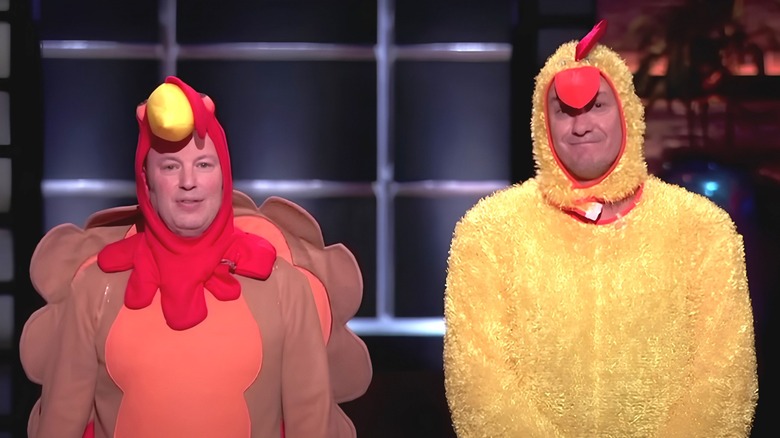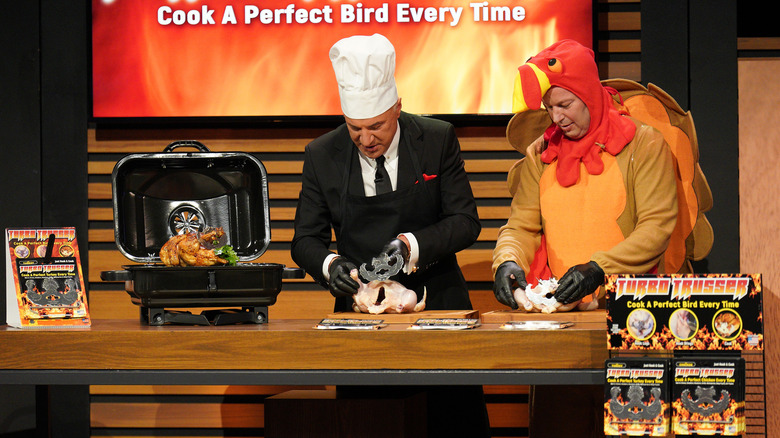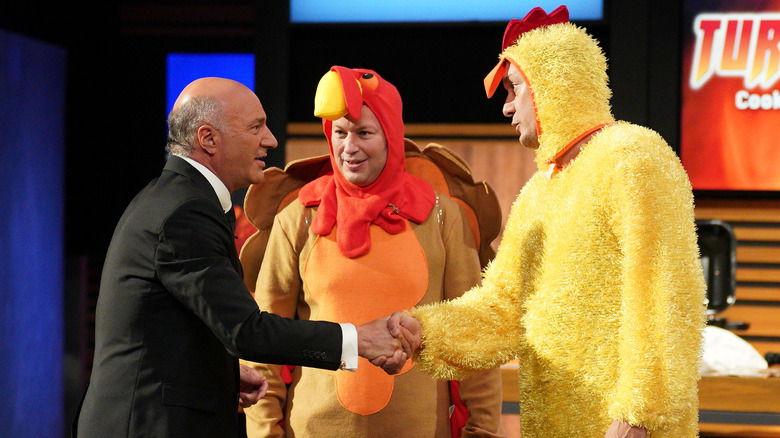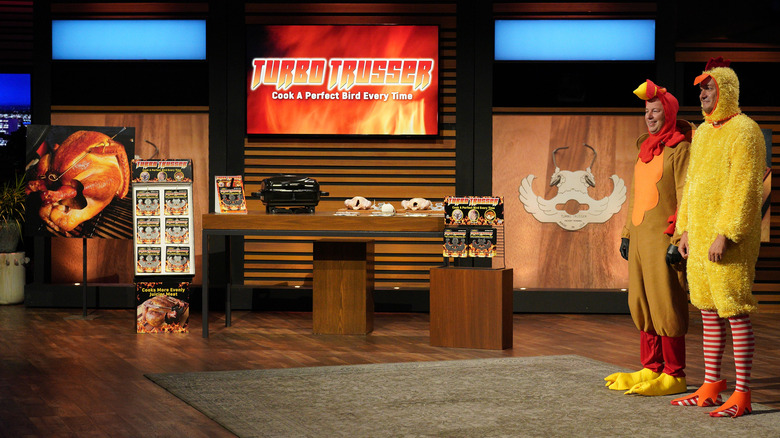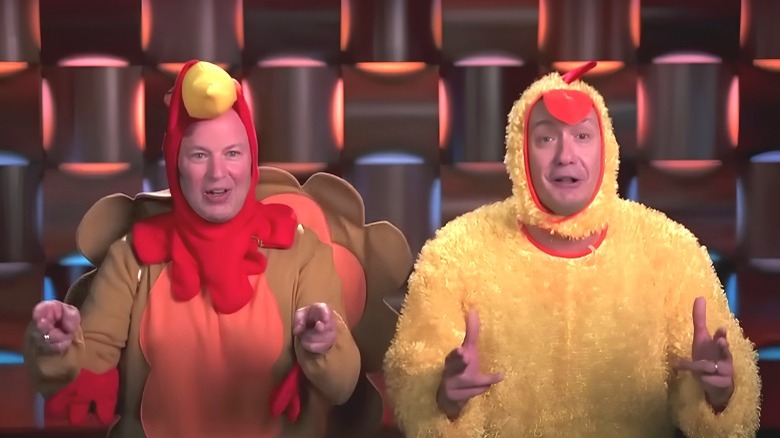Whatever Happened To Turbo Trusser After Shark Tank?
Brian Halasinski and Kirk Hyust weren't strictly culinarians when they started Turbo Trusser in March of 2021, but that didn't stop them from trying to make a "cluckload of money" from their handy poultry trussing device. Hyust attended the Culinary Institute of America in the early '90s before pivoting to work as a contractor, and Halasinski works in the pharmaceutical industry. The two Canton, Ohio, natives did, however, share a love of tinkering.
Hyust had previously invented and patented a multi-positional wrench, and Halasinski, wanting to do some inventing himself, teamed up with his friend. Together they created six products — four in the barbecue industry, two in pet care — and decided to take their next invention, Turbo Trusser, to "Shark Tank."
"We were just like, 'We got to do something that's fun and easy to manufacture,'" Hyust told Tasting Table. "We can eat chicken ... because we're cooking all the time. We can drink beer. We can hang out. We can actually work while we're having fun. That's pretty much why we got into it."
The product removes the finicky, messy, and technical work of trussing a bird with twine and replaces it with a stainless steel frame that does the job in seconds. The result is a juicy, properly cooked chicken or turkey without all the mess or time spent watching twine tutorials on YouTube.
Chef Wonderful was the only shark interested in Turbo Trusser
Brian Halasinski and Kirk Hyust were eager to make their "Shark Tank" debut, having applied twice before they were called up to the show. The pair made a fast and feathered impression on "Shark Tank," armed with turkey and chicken costumes and an arsenal of bird puns. They also came equipped with the hard numbers on Turbo Trusser. The pair came in seeking $100,000 for 10% equity in Turbo Trusser, and in the eight-and-a-half months they had been in business, they had already netted $90,000 in sales, with each unit retailing for $14.99. Moreover, of the 11,000 units sold, only one was returned.
Despite the promising pitch, the sharks started dropping like flies. Robert Herjavec said the company wasn't quite big enough. Similarly, Barbara Corcoran thought the operation wasn't big enough to justify a third partner. For Mark Cuban, Turbo Trusser wasn't scalable. Lori Greiner also took issue with the small size and admitted, "I really hate touching chicken."
That left Kevin O'Leary as the final potential investor, and he promptly took off his Mr. Wonderful hat and put on his Chef Wonderful toque, even donning an apron to test out the product himself. "I want to be the third chicken," he said, but only for the steep price of $100,000 for 33% equity, plus a $1 royalty fee on all units in perpetuity. The Turbo Trusser inventors couldn't get O'Leary to budge, but they took his deal nonetheless.
Turbo Trusser is thriving
For Brian Halasinski and Kirk Hyust, the deal couldn't come soon enough. "When we went on the show, we had $600 in our business bank account and like $4,000 in receivables," Hyust said in the same Tasting Table interview. "So we were running on fumes."
Luckily, Mr. Wonderful and the entrepreneurs finalized the deal the day the episode aired on September 30, 2022 — not always a guarantee on "Shark Tank," in which deals sometimes fall apart once the cameras turn off. Within hours, "Shark Tank" viewers were flocking to the Turbo Trusser website. By the end of 2022, the business partners had netted $290,000 in sales — a considerable uptick from their lifetime sales upon entering the Shark Tank.
Kevin O'Leary has also remained integral to the company's growth, even making an appearance on "Good Morning America" in June of 2023 to show off the Turbo Trusser in action. He made a Mediterranean chicken recipe developed by Hyust and also coined a new catchphrase for the company: "Don't fuss it, just truss it!"
Turbo Trusser experienced the downside of publicity
Even without a deal, it's hard to dismiss the sales bump that comes with "Shark Tank" publicity, a phenomenon that's come to be known as the "Shark Tank" effect. "Just being on 'Shark Tank' alone [gives you] that credibility," Brian Halasinski said in an interview with Where the Food Comes From. "Having that seen on 'Shark Tank' is validation."
But there's a downside to all that publicity. Not long after Turbo Trusser made its TV debut in the Season 14 episode of "Shark Tank," copycat retailers began surfacing on the internet. Kirk Hyust estimates about 178 competitors took advantage of the company's newfound visibility.
"They hijacked our Amazon account," Hyust said to Tasting Table. "They actually got on our listing. People were ordering them and thought they were getting them from us. And here it said, you know, they're coming from China." As a result, Turbo Trusser lost almost $300,000 in sales. "We got rid of them, thank God," Hyust continued, which was thanks to the help of the International AntiCounterfeiting Coalition. "But, you know, it's an ongoing thing."
There are more Turbo Trusser products in the works
Upon entering the Shark Tank, Turbo Trusser came in two sizes: one that could accommodate a 4- to 10-pound chicken or duck, and a larger model meant for turkeys or geese weighing between 10 and 25 pounds. Now, there's a smaller size meant for cooking Cornish hens. The website also sells the TurboTex, a portable grill attachment that's compatible with a number of grills.
But there's even more cooking at Turbo Trusser HQ. Brian Halasinski and Kirk Hyust are expanding to edible products, including a poultry brine and an all-purpose spice rub. Halasinski said in the same July 2023 interview with Where the Food Comes From, "[We want to] keep our niche with poultry and go from there. We just have to be better than we were last year and continue to grow and make good products."
For the business partners, any future business growth is welcome, so long as it stays in Ohio. They hope to keep the company a local enterprise. "All of our stuff is made locally in Northeast Ohio," Halasinski explained. "So we are all about creating jobs here in the local community."
Static Media owns and operates Looper and Tasting Table.
